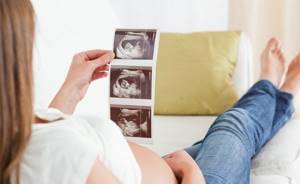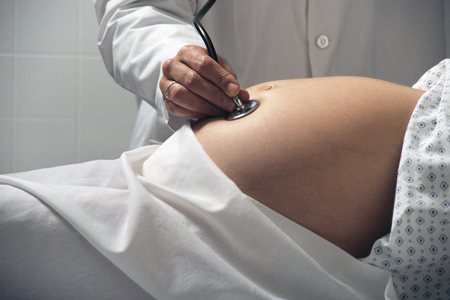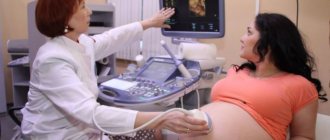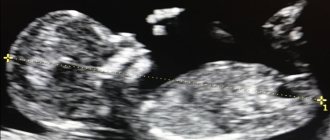Screening methods are research methods that can be used for mass examination due to their safety and ease of implementation.
Biochemical screening is the determination of certain specific substances (“markers”) in the blood that change in certain pathologies. During pregnancy, biochemical screening is performed for neural tube defects (brain and spinal cord) and chromosomal abnormalities (Down syndrome and Edwards syndrome).
Biochemical screening does not allow diagnosis. It only allows, with varying degrees of probability, to identify women with a high or low risk of pathology. To make a diagnosis, additional research methods are required (ultrasound, invasive diagnostics - cordocentesis, amniocentesis).
What is perinatal screening?
This is a set of examination methods that help verify the normal development of the child. During the entire period, the expectant mother is prescribed a screening ultrasound twice together with a biochemical blood test.
What are the most common pathologies detected in the development of the neural tube?
- The first screening is carried out at 10-12 weeks. The indicators of this procedure help diagnose Down and Edwards syndrome (screening reveals trisonomies of 18 and 21 chromosomes);
- The second screening takes place at 18-21 weeks;
- Anencephaly;
- Spina bifida;
- Other.
“Con” No. 3: “I have good heredity - I don’t need screenings”
Some mothers do not see the point of undergoing screenings during pregnancy - all relatives are healthy, what problems could there be? Indeed, there are certain groups of women who are first recommended to undergo testing to identify possible pathologies in the development of the child. These are women over 35-40 years old (since after this age the risk of developing abnormalities in a child increases several times) and expectant mothers with certain diseases (for example, diabetes). Of course, those mothers whose families already have children or relatives with genetic diseases are also at risk. However, the majority of doctors (not only in Russia, but also in many European countries and America) are of the opinion that all women must undergo prenatal screening, especially if it is their first pregnancy.
Perinatal screening: basic diagnostic methods
- Ultrasound. Using special equipment, a specialist examines the image, assessing the general condition of the fetus and making the necessary measurements.
- Dopplerography during pregnancy. Fetal Dopplerography is a subtype of ultrasound, which is performed in a similar way. This diagnostic method allows specialists to understand the correct functioning of blood flow in the umbilical cord.
- Cardiotocography (CTG). It is carried out in parallel with ultrasound. The sensor is attached to the stomach in a place where the baby's heartbeat can be clearly heard.
- Blood chemistry. Determines the likelihood of serious diseases in the baby by analyzing the number of individual types of protein in the blood of the expectant mother.
- Invasive methods. Used only in cases of high probability of genetic abnormalities.
At risk are:
- Age above 35 years.
- Taking drugs dangerous to the fetus.
- For women who have had frozen pregnancies or miscarriages.
- Having a family history of hereditary abnormalities of fetal development.
- Having conceived children from a close relative.
- Parents exposed to radiation before conception.
Preparing for a screening examination?
Before the procedure itself, a pregnant woman undergoes a survey about: weight, age, past pregnancies and births, previous diseases, etc.
Recommendations before screening
Positive attitude. Stress often worsens performance. You should also avoid intimate relationships 4 days before diagnosis. For biochemical analysis, you should not eat food 3 hours before blood sampling. During an abdominal examination, you should definitely drink one glass of plain water half an hour before the procedure.
What myths are associated with pregnancy screening?

No. 1: Ultrasound is dangerous for the child
Many women express the opinion that ultrasound is excessively dangerous for the fetus. There is an opinion about screening that this procedure disrupts the functioning of the nervous system and is very annoying for the baby. Is this true or is it still a prejudice among pregnant women?
Is ultrasound harmful during pregnancy? Doctors are categorically against these statements. Experts say that all medical equipment is currently safe for babies. Official medicine is convinced and insists that ultrasound diagnostics be carried out for all pregnant women without exception. If you make a diagnosis in time, you can correct some deviations.
Among specialists, the first screening during pregnancy is considered necessary.
During diagnosis:
- the number of embryos will be determined;
- the gestational age is specified;
- the absence of developmental anomalies is confirmed;
- the amount of subcutaneous fluid in the baby’s neck is analyzed;
- The presence or absence of the nasal bone is examined.
Doctors around the world are absolutely convinced that prenatal screenings are necessary for all pregnant women, especially if this is a woman’s first pregnancy.
No. 2: “I and/or my husband have no abnormalities in our family - why do I need these procedures?”
Many pregnant women are absolutely sure that if they have good heredity, no problems will arise.
Of course, first of all, women from the risk group should undergo prenatal screening: over 35 years of age (this age period is very dangerous for the development of pathologies), with chronic diseases, for example, diabetes, and with children with genetic diseases.
Let us repeat once again that doctors consider perinatal screenings mandatory.
No. 3: Biochemical screening results are unreliable
Pregnant women are convinced that it is absolutely impossible to give accurate results using biochemical analysis, because many circumstances influence the final assessments. Why then waste money and nerves? Why inject veins again?
Biochemical screening is a diagnostic that helps identify women who are at risk. A hormone that exists exclusively in the body of a pregnant woman is analyzed. Doctors are interested in two things: a unique protein in the blood of pregnant women, PAPP-A, and the free beta subunit.
The results are evaluated thanks to a program that compares the result with the norm.
The first biochemical screening can detect severe chromosomal abnormalities.
In the second trimester, after screening, specialists are interested in the hormones estriol and human chorionic gonadotropin (hCG), as well as protein (AFP) produced in the fetal liver. If protein levels are too high, then abnormalities in the development of major organs are possible. But keep in mind that elevated AFP levels are normal in multiple pregnancies. The hormone estriol helps doctors understand that the placenta is working normally and the baby is getting everything it needs, the whole body and its defenses are functioning perfectly. All results of the second analysis are processed by a computer program to understand where there are deviations from the norm. For example, low levels of estriol and AFP, and high hCG - there is a possibility of Down syndrome.
After the second screening, all results are correlated with the first.
If deviations are determined, the expectant mother visits a geneticist. The specialist may decide to order additional tests. But they are no longer safe, so they are recommended to be done in case of a high probability of pathology. The main thing: all examinations are carried out only with the approval of the pregnant woman.
Bottom line: all conclusions are made by a specialist, taking into account a complex of individual factors.
No. 4: Possible deviations in the child’s development cannot be corrected
Unfortunately it's true. Experts will not be able to help the child if, after all the tests, the baby is diagnosed with fetal anomalies. Therefore, very often overly emotional women refuse to undergo screening.
What is better in this situation - to refuse research and be in the dark for the entire nine months of pregnancy or to undergo screening - is an individual matter.
No. 5: “I don’t want to hear a bad report from doctors”
The most compelling argument against the screening procedure. Expectant mothers are terribly afraid of hearing something bad. Many people have a fear of medical errors, because there have often been cases when diagnostic results were false positive or false negative.
For example, after screenings, a woman was given a diagnosis that the child would be born with Down syndrome, but, fortunately, the baby was born absolutely healthy. Of course, these are precisely the situations in life that do not have a positive impact on a woman’s mood during the remaining period of pregnancy, and constant stress and anxiety have a bad effect on the baby’s health.
It must be remembered: the results of prenatal screenings are not the basis for making a diagnosis; doctors use screening to determine probable risks.
Cons No. 1: Ultrasound is harmful to the baby
There is a fairly widespread opinion that ultrasound negatively affects the child’s nervous system and irritates him - during the examination, children often try to hide from the machine and cover their heads with their hands. Therefore, children whose mothers regularly had ultrasound scans during pregnancy are more restless compared to babies whose mothers refused ultrasound diagnostics. Is it really?
According to doctors, ultrasound cannot cause any harm to the baby - modern equipment is absolutely safe. Therefore, official medicine insists that absolutely all pregnant women undergo an ultrasound. After all, timely diagnosis allows, firstly, to see the full picture of the course of pregnancy, and secondly, if necessary, to correct certain problems.
An ultrasound examination is performed at least three times during pregnancy (in the first trimester at 11-13 weeks, in the second at 18-21 and in the third at 30-32 weeks), but if necessary, the doctor may recommend it be done more often.
The data obtained from the ultrasound of the first prenatal screening (at 11-13 weeks of pregnancy) are considered especially important. At this time during the study:
- the number of embryos in the uterus and their viability are determined;
- a more accurate gestational age is set;
- gross malformations are excluded;
- the thickness of the collar space is determined - TVP (i.e. the amount of subcutaneous fluid on the back surface of the child’s neck is measured - normally TVP should not exceed 2.7 mm);
- The presence or absence of the nasal bone is examined.
For example, in children with Down syndrome, the fluid content is much higher than normal, and the nasal bone is often not visualized.
When is screening not recommended during pregnancy?

Contraindicated for:
- elevated body temperature;
- acute respiratory infections, ARVI;
- any viral or infectious diseases;
- stressful condition.
Why? It turns out that even the most minor changes in the body, the slightest cold or runny nose, not to mention serious illnesses, can greatly affect the performance. Therefore, before donating blood, you need to visit a gynecologist.
A woman has every right to refuse to conduct any diagnostics and any tests. A woman decides for herself what she needs and what she doesn’t. It should be understood that there is no real help for poor screening results. If the anomalies are confirmed, only future parents will be able to make a decision after weighing all the pros and cons.
“Con” No. 4: “I’m afraid of hearing a bad diagnosis”
This is perhaps one of the strongest arguments against screening during pregnancy. Expectant mothers are very frightened by the possibility of hearing something bad about the baby’s development. In addition, medical errors are also a concern - sometimes screenings give false positive or false negative results. There are cases when the mother was told that the child was suspected of having Down syndrome, and subsequently a healthy baby was born. Of course, needless to say, such news greatly affects the emotional state of the mother. After a preliminary conclusion is made, a woman spends the rest of her pregnancy in constant worry, but this is also not at all beneficial for the baby’s health.
However, we should not forget that the results of prenatal screenings in no way serve as a basis for making a diagnosis. They only identify probable risks. Therefore, even a positive screening result will not be a “sentence” for the child. This is just a reason to get professional advice from a geneticist.










